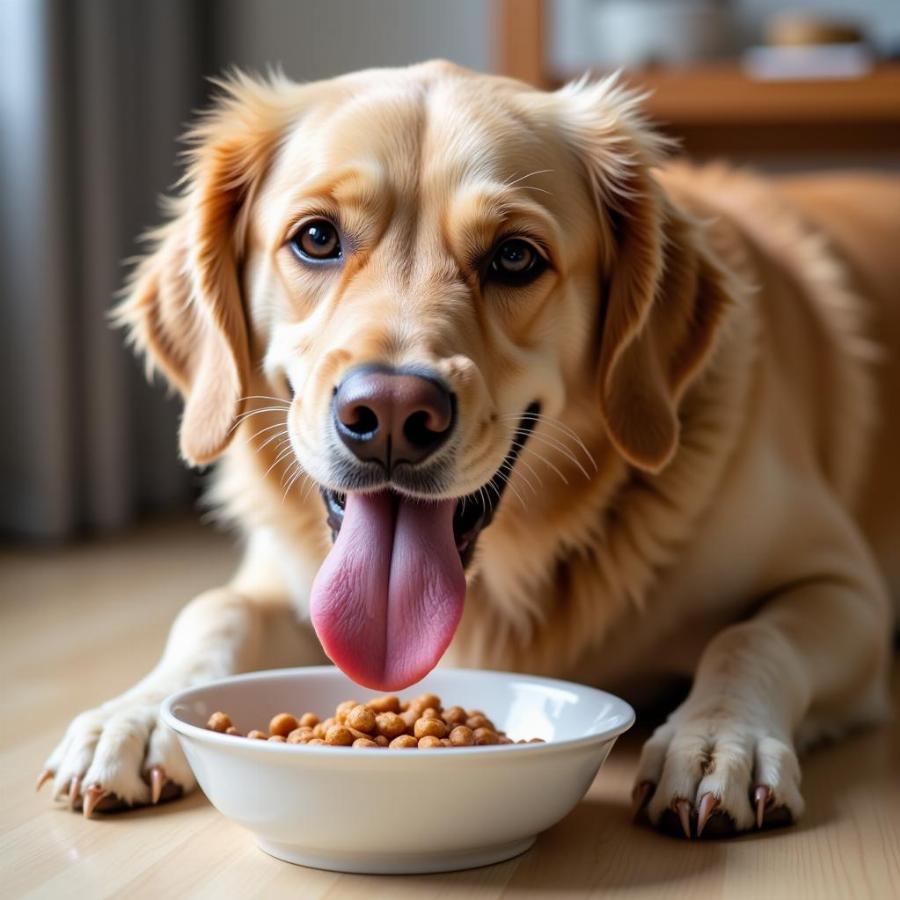Choosing the right food for a senior dog with a sensitive stomach can be a challenge. As dogs age, their digestive systems can become more delicate, making them prone to upset stomachs. Finding a diet that is both gentle and nutritious is key to ensuring your furry friend stays happy and healthy in their golden years. This guide will delve into the world of sensitive stomach dog food for seniors, providing you with valuable insights to help you navigate the options and make the best choice for your beloved companion.
Understanding Sensitive Stomachs in Senior Dogs
As dogs enter their senior years, their bodies undergo various changes, including a decrease in digestive enzyme production and a slower metabolism. These changes can make them more susceptible to digestive upset. Common signs of a sensitive stomach in senior dogs include vomiting, diarrhea, gas, loss of appetite, and weight loss. Identifying and addressing these signs is crucial to maintaining your dog’s overall well-being.
What causes these sensitivities? Several factors can contribute, including food allergies or intolerances, inflammatory bowel disease (IBD), pancreatitis, and even stress.
Identifying Food Intolerances and Allergies
Food intolerances and allergies are common culprits behind sensitive stomachs. While intolerances cause digestive discomfort, allergies can trigger a more severe immune response. Common allergens include beef, chicken, dairy, wheat, and soy. Eliminating these ingredients from your senior dog’s diet can significantly improve their digestive health.
Choosing the Right Sensitive Stomach Dog Food for Seniors
Selecting the right food involves considering several factors. Look for foods with easily digestible ingredients like rice, lamb, or fish.
Key Ingredients to Look For
- Hydrolyzed protein: Broken down proteins are easier to digest and less likely to trigger allergic reactions.
- Prebiotics and probiotics: These support a healthy gut microbiome, improving digestion and nutrient absorption.
- Fiber: A moderate amount of fiber can help regulate bowel movements and prevent constipation.
- Omega-3 fatty acids: These have anti-inflammatory properties that can soothe the digestive tract.
Ingredients to Avoid
- Artificial colors, flavors, and preservatives: These additives can irritate sensitive stomachs.
- Fillers: Ingredients like corn and wheat can be difficult to digest.
- High-fat content: Excessive fat can exacerbate digestive issues.
Feeding Guidelines for Senior Dogs with Sensitive Stomachs
Transitioning to a new food should be done gradually to avoid further upsetting your dog’s stomach. Start by mixing a small amount of the new food with their current food, gradually increasing the proportion of new food over several days.
Small, Frequent Meals
Feeding smaller, more frequent meals can help ease the digestive process.  Small, Frequent Meals for Senior Dogs This also prevents the stomach from becoming overloaded, reducing the risk of vomiting and diarrhea.
Small, Frequent Meals for Senior Dogs This also prevents the stomach from becoming overloaded, reducing the risk of vomiting and diarrhea.
Monitoring Your Dog’s Response
Observe your dog closely after introducing a new food. Look for improvements in their digestion and overall well-being. If symptoms persist or worsen, consult your veterinarian.
When to Consult Your Veterinarian
If your senior dog is experiencing persistent digestive issues, it’s important to seek professional advice. Your veterinarian can diagnose the underlying cause and recommend the most appropriate course of treatment, which may include a specific diet or medication.
Conclusion
Finding the perfect sensitive stomach dog food for your senior dog requires careful consideration and observation. By understanding the causes of digestive sensitivities and choosing a food with appropriate ingredients, you can help your beloved companion enjoy their golden years with a happy and healthy tummy. Remember to consult your veterinarian if you have any concerns about your dog’s health.
FAQ
-
What are the signs of a sensitive stomach in senior dogs? Common signs include vomiting, diarrhea, gas, loss of appetite, and weight loss.
-
What ingredients should I avoid in senior dog food? Avoid artificial colors, flavors, preservatives, fillers, and high-fat content.
-
How should I transition my senior dog to a new food? Gradually mix the new food with their current food over several days.
-
How often should I feed my senior dog with a sensitive stomach? Feed smaller, more frequent meals.
-
When should I consult a veterinarian? If your dog’s digestive issues persist or worsen, consult your veterinarian.
-
What are some good protein sources for senior dogs with sensitive stomachs? Hydrolyzed protein, lamb, and fish are often well-tolerated.
-
Are there any specific brands of senior dog food recommended for sensitive stomachs? Consult your veterinarian for personalized recommendations based on your dog’s specific needs.
Suggested Further Reading:
fromm wet dog food might be a good option for some senior dogs. For those who prefer dry food, check out our review of the best dry dog food for senior dogs. Wondering about other dog food brands? See our review of is 4health a good dog food. Looking for treats? Explore our fromm treats for dogs article. Also, you may be interested in canidae dog food reviews.
Beaut Dogs: Your Partner in Canine Care
Beaut Dogs is your one-stop resource for all things canine, offering reliable and in-depth information on various dog breeds and their care. From nutrition and training to health and grooming, we provide expert guidance to help you nurture your beloved companion. When you need support, contact us at Email: [email protected] to get detailed and accurate answers from Beaut Dogs.